Published: Jan 31, 2022
Written by: Dr Ruby Campbell

Kate is a highly intelligent sales leader in an IT multinational, with impressive academic and post-graduate qualifications, and with equally impressive career experience as a sole contributor. Kate was initially adamant that her EI (emotional quotient or emotional intelligence) was “above average for a senior leader in IT” because she thought it meant making time to listen to everyone with empathy. She was therefore confused as to why her team was floundering when she was promoted to General Manager.
In our experience, many leaders believe that EI and empathy are one and the same thing. For those who are inherently empathetic, they may claim that EI is about indiscriminately showing all our emotions (both positive and negative).
The problem here is that they’re not considering the impact of those emotions on others. It’s therefore essential to spend sufficient time explaining and contextualising what EQ is and what it isn’t.
Kate discovered throughout the coaching process, which began with developing greater self-knowledge, that she needed to improve her self-awareness, self-management, social skills and relationship management skills. She was surprised to learn that these are the 4 domains of EI.
Emotional intelligence (EI) is the capability of individuals to recognise their own emotions and those of others, discern between different feelings and label them appropriately, use emotional information to guide thinking and behaviour, and manage and/or adjust emotions to adapt to envi¬ronments or achieve one’s goal(s). There are several models cur¬rently applied by psychologists and coaches, many of which have been extensively researched, to measure EI.
In our leadership coaching programs we often refer to Daniel Goleman’s EI model because it’s easy for our clients to understand how it applies to leadership. The model intro¬duced by Goleman focuses on four main domains - self-awareness, self-management, social awareness, and relationship management - that drive leadership performance. The model then includes a set of competencies within each domain of EI, as illustrated in figure 1 below.
Figure 1. The 4 domains and 12 competencies of Emotional Intelligence (EI)
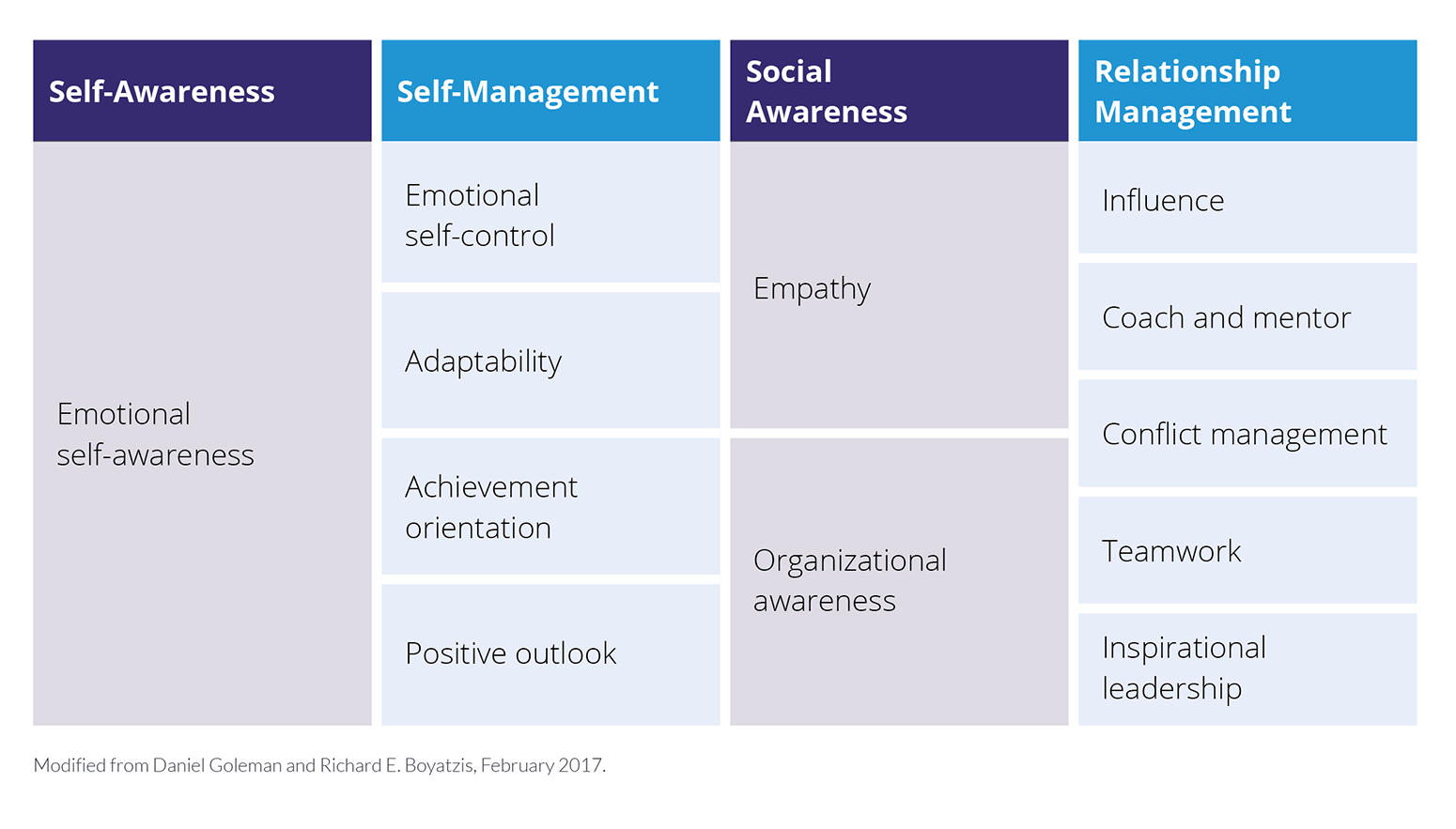
Emotional intelligence is not something we are born with. Rather, it is something that can be developed through intentional learning & development interventions such as leadership coaching. For instance, Kate thought she was adequately empathetic in her job until we spent quite a bit of time understanding what these competencies meant and how they were applied to her personal and work lives.
Each competency easily warrants its own book (as you’ve no doubt discovered when searching for leadership books!). Coaching psychology practioners like myself have studied the seminal work of the two pioneers of Emotional Intelligence – Daniel Goleman and Richard Boyatzis – and we therefore ensure that our evidence-based coaching work reflects their latest research and practice. I consider myself to be lucky to have met them both at the IOC McLean Hospital/Harvard Medical School Affiliate’s 2018 Leadership Conference.
Deep listening to their lectures, interacting with them in person, and later revisiting their voluminous body of work, made it possible for me to see how the leader’s EI impacts their own wellbeing, the wellbeing of their teams, and how it ultimately opens the door to leadership effectiveness.
As such, the 12 competencies of EI were described in my 2019 book “Scientists in Every Boardroom: Harnessing the Power of STEMM Leaders in an Irrational World”, Chapter 8, pp. 127-142. To further emphasise the pivotal role EI plays in leadership coaching, it was purposely placed at the centre (at the heart) of the coaching model: The SCIENCE of Leadership. The framework, or model, provides a flexible approach to leadership development, especially for those undergoing any type of professional transition.
Figure 2. The SCIENCE OF Leadership Coaching Model
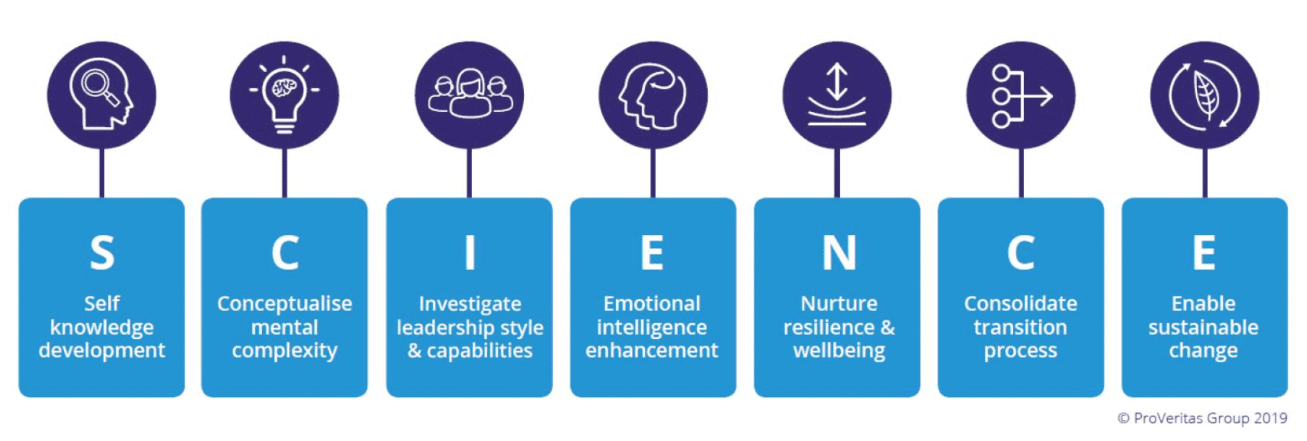
Empathy means having the ability to sense others’ feelings and how they see things. Leaders with empathy take an active interest in others’ concerns. They pick up cues to what’s being felt and thought. They sense unspoken emotions. They listen attentively to understand the other person’s point of view, the terms in which they think about what’s going on.
Many of our clients will initially come to coaching with a limited understanding of what empathy really is. This is understandable, given all the hype in social media (just do a Google search and hundreds of articles will show up). According to Daniel Goleman, in his 2013 book Focus: The hidden driver of excellence, there are three kinds of empathy:
How do we know if/when it’s appropriate to enact cognitive empathy, emotional empathy and/or compassion as leaders? All three kinds of empathy are important, especially when developing organisational awareness and relationship management capabilities. It is however paramount to learn their relative applicability and appropriateness. This typically occurs within the coaching process as we discuss real life examples, practise within a safe space, provide contextual feedback and continue to evolve within a positive learning cycle.
A precursor to any EI conversation in our coaching programs is Mindfulness practice. Being mindful is the opposite of being in auto-pilot mode when you don’t know why you’ve acted or felt a certain way. Developing mindfulness helps us pay conscious attention to the present and hence, to our thoughts (which drive our emotions and then our actions). We can then learn to manage our thoughts for better outcomes.
To answer this question, it might help to first ask: have organisational and national leaders shown emotional intelligence in their decisions to date? Let’s consider the evidence…
We’ve endured over 2 years of the Covid-19 global pandemic, as of writing this article. This global crisis had been forewarned by hundreds of scientists around the world, as discussed in Scientists in Every Boardroom (Campbell, 2019). By exploring leadership theory and practice from an evidence-based perspective and with scientific curiosity, we have discovered the need to reimagine and redefine leadership – also summarised in Leadership Reimagined: Enter the 21st Century Leader (Campbell, 2021).
The Institute of Coaching, McLean Hospital/Harvard Medical School Affiliate, where I am a Fellow member, published a qualitative research report titled Leading with Humanity: The Future of Leadership and Coaching (IOC, 2021). The results suggest that “human-centred leadership”, with a focus on social connection, benevolence, and compassion, emerged during the pandemic crisis.
Humans seem to be transformed by adversity, sometimes thought of as being “twice born”. This term was used by leadership development expert Manfred Kets DeVries’ in his 2014 book Mindful Leadership Coaching: Journeys Into The Interior, explaining how overcoming adversity may transform a person to become a change agent. Twice-born individuals are said to have a different way of relating to other people and the world because of their deep recognition of the fragility of life.
Whilst it is impossible to expect leaders to undergo adversity to develop EI, the coaching conversation can be geared towards vicariously experiencing others’ suffering. We don’t just discuss in detail each of the EI competencies (Fig 1), we also offer experiential learning opportunities depending on the client’s maturity, personality strengths, values, and drivers.
As coaches, we’re mindful that clients often look to us for inspiration. Hence, highly experienced coaches tend to seek a self-reflective life, often considering the greater good in their actions. By intentionally being more empathetic (cognitive, emotional and/or compassion, depending on the circumstances), we may open the door to further self-transformation and transcendence.
That’s not to say that all leaders must aspire to this to be able to lead well. However, it is essential that leaders develop the 12 competencies of EI as an integral aspect of their leadership development and career.
For Kate, developing EI was relatively easy since she had always worked in sales and had developed basic constructive communication habits. However, she had some blind spots concerning behavioural patterns that were adversely affecting relationships. These blind spots stemmed from feelings of social inadequacies, projected as somewhat aggressive and com¬petitive behaviour.
We used several techniques such as reflective journaling (with guided questions), to help her monitor her thoughts and emotions. She completed an 8-week coach-guided course on mindfulness whilst diving into the EI competencies. Within a few months she was inspiring and influencing her peers as well as members of her team, achieving unimaginable sales in less than 12 months. Within 24 months her business unit spear-headed the biggest regional turnaround in the recent history of the company.
All leaders need to develop EI. The workplace will continue to change dramatically with the replacement of humans with AI in manual and technical jobs. We’ll therefore see the proliferation of jobs requiring individuals, and leaders, with sophisticated people skills to collaborate on the generation and implementation of creative solutions, often across multiple demographics. EI will continue to rise as a key competency – one that differentiates between good leaders and exceptional ones.
OUR KEY leadership coaching solutions
Emotional Intelligence, visioning, sense-making, inventing and other essential leadership capabilities.
Evidence-based, customised L&D solutions to equip 21st Century leaders achieve business outcomes sustainably.
Helping teams function as more than “the sum of its parts” by learning how to connect and collaborate effectively.
Helping organisations understand, develop and action evidence-based ESG strategies with humanity in mind.
Executive Leadership Media & Podcasts
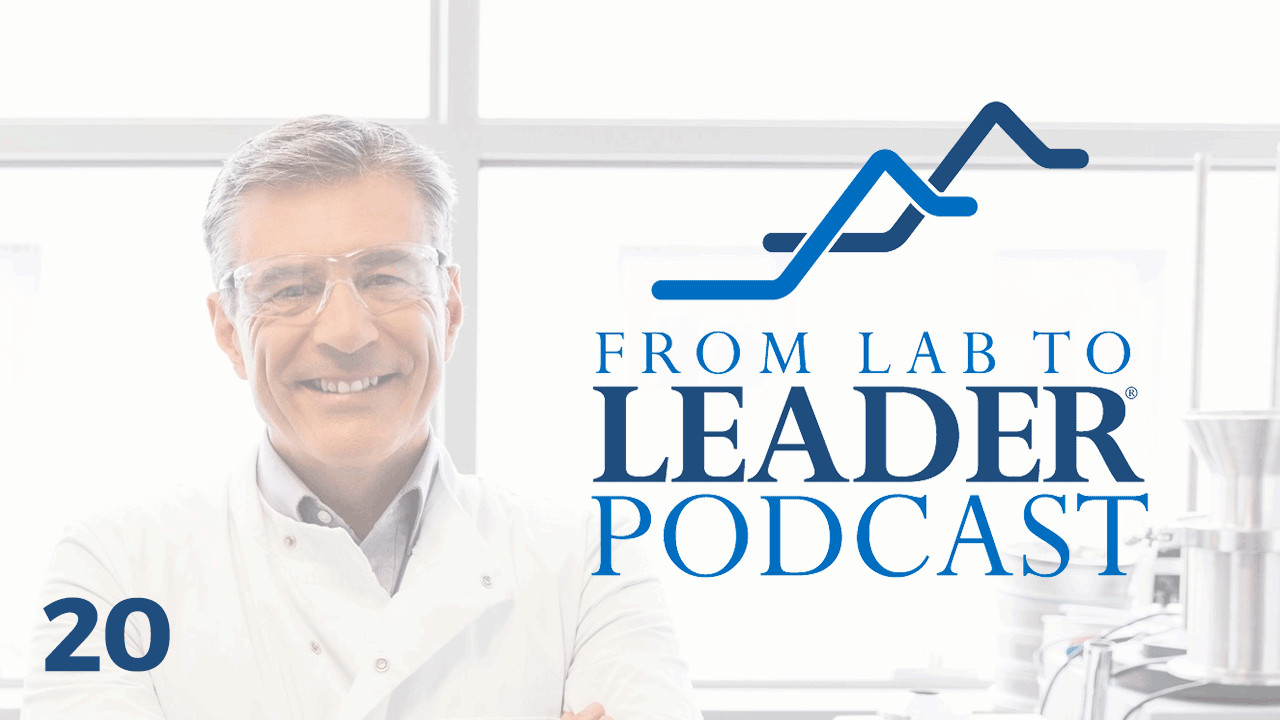
Podcast: Ruby Campbell’s SCIENCE Coaching Model - Episode 20
LISTEN NOW HERE
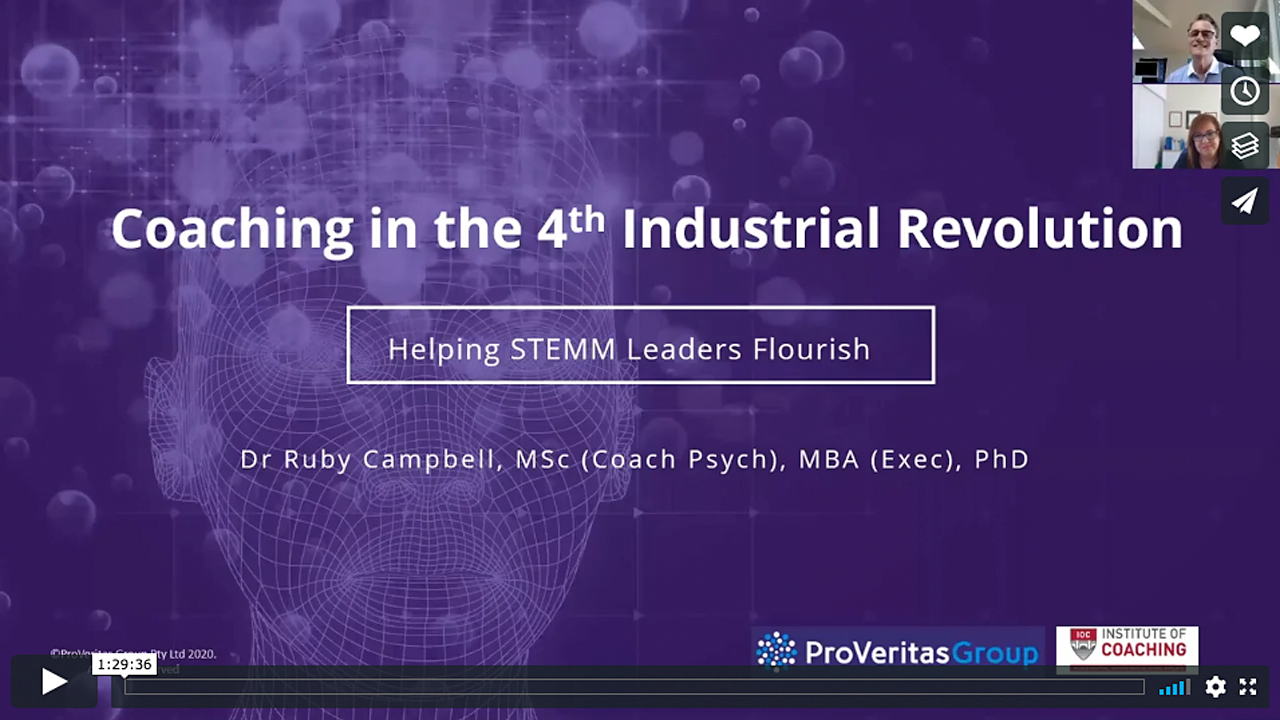
Webinar: Dr Ruby Campbell with the IOC McClean Hospital/Harvard Medical School Affiliate on 'Coaching in the 4th Industrial Revolution'. Leadership Coaching has become one of the most effective Learning &...
VIEW VIDEO HERE
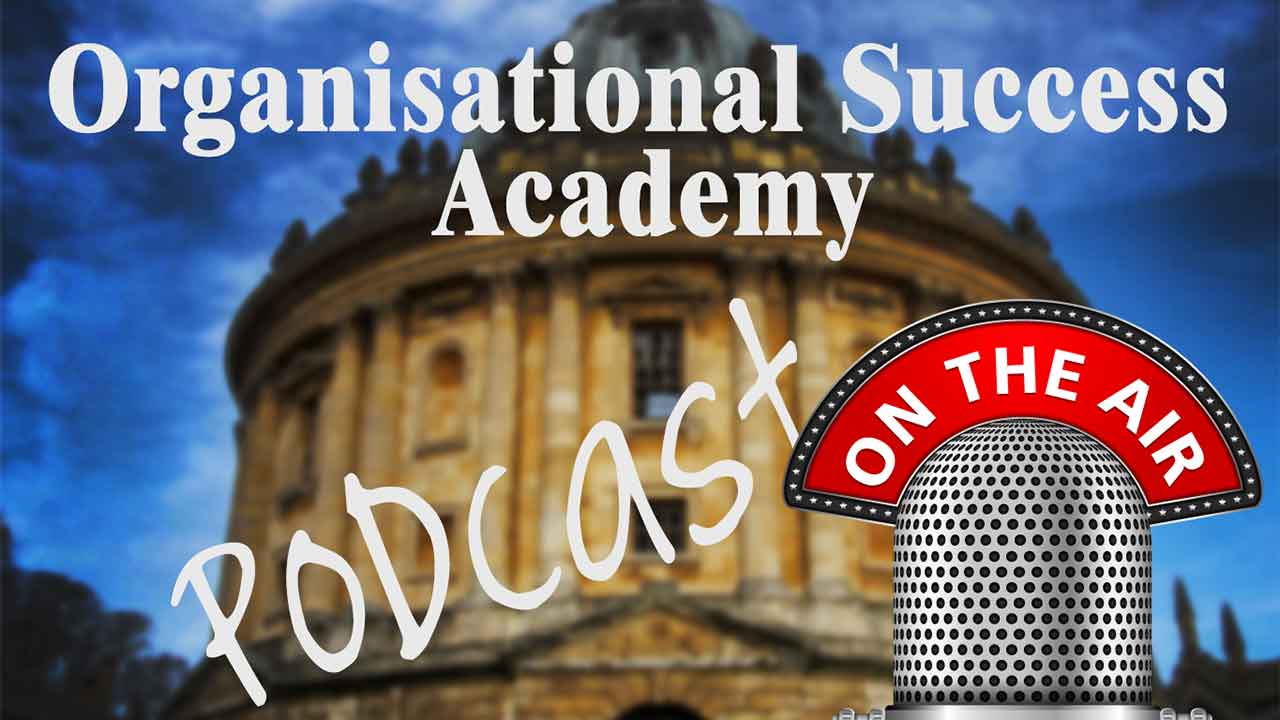
Podcast: In this episode from The Oxford Review Podcast, an interview from Dr Ruby Campbell, author of Scientists in Every Boardroom: Harnessing the power of STEMM leaders in an irrational...
LISTEN NOW HERE
Dr Ruby Campbell is the founder and Managing Director of ProVeritas Leadership, and Executive Coaching and Consulting firm. She is also the author of the ground-breaking book Scientists in Every Boardroom: Harnessing the Power of STEMM Leaders in an Irrational World.
MORE ABOUT OUR TEAM
Please complete the enquiry form so we can help you with your growth journey. You will receive an email from us within 24 hours.